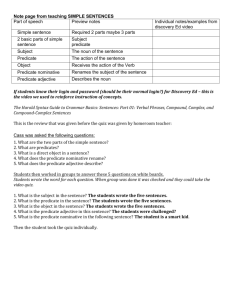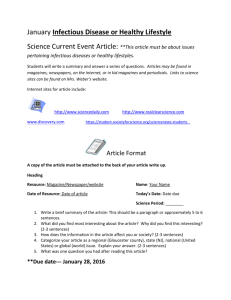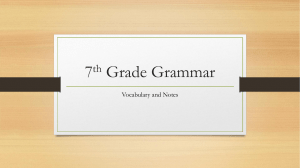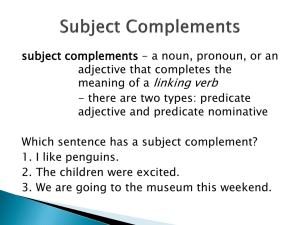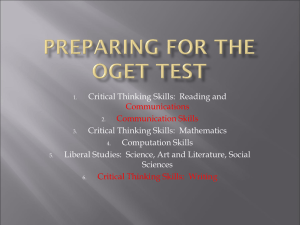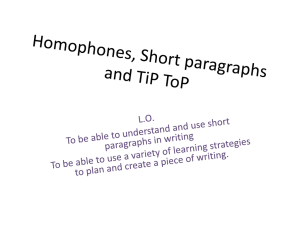a lesson on the elements of a declarative sentence
advertisement
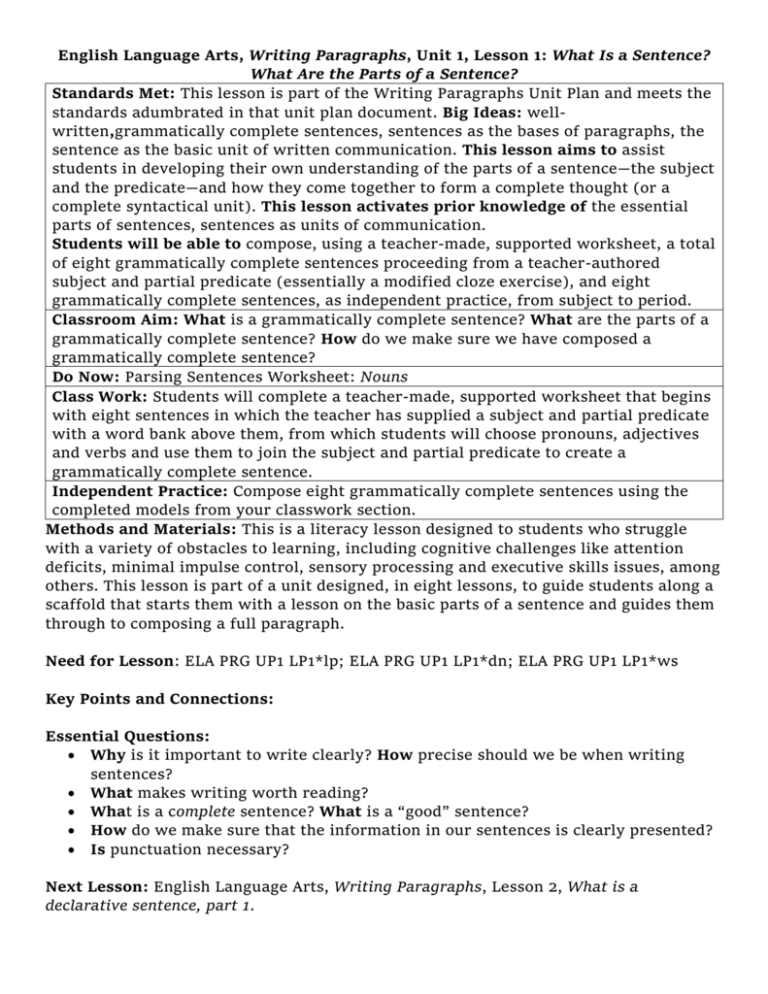
English Language Arts, Writing Paragraphs, Unit 1, Lesson 1: What Is a Sentence? What Are the Parts of a Sentence? Standards Met: This lesson is part of the Writing Paragraphs Unit Plan and meets the standards adumbrated in that unit plan document. Big Ideas: wellwritten,grammatically complete sentences, sentences as the bases of paragraphs, the sentence as the basic unit of written communication. This lesson aims to assist students in developing their own understanding of the parts of a sentence—the subject and the predicate—and how they come together to form a complete thought (or a complete syntactical unit). This lesson activates prior knowledge of the essential parts of sentences, sentences as units of communication. Students will be able to compose, using a teacher-made, supported worksheet, a total of eight grammatically complete sentences proceeding from a teacher-authored subject and partial predicate (essentially a modified cloze exercise), and eight grammatically complete sentences, as independent practice, from subject to period. Classroom Aim: What is a grammatically complete sentence? What are the parts of a grammatically complete sentence? How do we make sure we have composed a grammatically complete sentence? Do Now: Parsing Sentences Worksheet: Nouns Class Work: Students will complete a teacher-made, supported worksheet that begins with eight sentences in which the teacher has supplied a subject and partial predicate with a word bank above them, from which students will choose pronouns, adjectives and verbs and use them to join the subject and partial predicate to create a grammatically complete sentence. Independent Practice: Compose eight grammatically complete sentences using the completed models from your classwork section. Methods and Materials: This is a literacy lesson designed to students who struggle with a variety of obstacles to learning, including cognitive challenges like attention deficits, minimal impulse control, sensory processing and executive skills issues, among others. This lesson is part of a unit designed, in eight lessons, to guide students along a scaffold that starts them with a lesson on the basic parts of a sentence and guides them through to composing a full paragraph. Need for Lesson: ELA PRG UP1 LP1*lp; ELA PRG UP1 LP1*dn; ELA PRG UP1 LP1*ws Key Points and Connections: Essential Questions: Why is it important to write clearly? How precise should we be when writing sentences? What makes writing worth reading? What is a complete sentence? What is a “good” sentence? How do we make sure that the information in our sentences is clearly presented? Is punctuation necessary? Next Lesson: English Language Arts, Writing Paragraphs, Lesson 2, What is a declarative sentence, part 1. Name Date Writing Paragraphs Unit 1, Lesson 1 Do Now: The verb parse means either to resolve (as a sentence) into component parts of speech and describe them grammatically or to describe grammatically by stating the part of speech and explaining the inflection and syntactical relationships. At one time in the United States, parsing sentences was a basic part of English classes; it remains an excellent way to learn to write sentences. On this worksheet we are parsing sentences to identify nouns, which are words that name a person, place or thing or idea. Most nouns have a plural form and a possessive form. Carol; the park; the cup; democracy. Please circle or underline the nouns in each sentence below. 1. ***** gave ***** a fountain pen, a pencil, and a magic marker and told *** to decide which instrument *** wanted to use. 2. The zombies helped themselves to some fresh brains, and complemented it with salad, a cocktail, then had a nice dessert of espresso and cannolis. 3. ***** and **** went on a tour of the Guggenheim Museum, where they looked at paintings, drawings, sculpture and photography. 4. *****, ***** and **** went to the movie theater in Times Square to see “***********.” Afterward, they went out for tea and scones. 5. Our class went on a trip to Symphony Space with *********, where they saw a concert featuring the music of Fela Kuti. Name Date English Language Arts, Writing Paragraphs Unit 1, Lesson 1 Worksheet: What Is a Sentence? For a sentence to be grammatically complete it must contain, at the very least, the two fundamental parts of a sentence: a noun or noun phrase (the subject) and a verb (the predicate). A sentence that lacks a noun or a verb is by definition incomplete. In the examples that follow, the subject is in bold, and the predicate is in italics: The dog barks. Fishes swim. Chefs cook. Teachers talk. Cats meow. Rivers flow. Ferris wheels rotate. You will benefit from memorizing these grammatical terms, as they are adapted from William Strunk and E.B. White’s classic book on good writing, The Elements of Style (New York: Longman, 2000): Subject: The noun or pronoun that indicates what a sentence is about, and which the principal verb of a sentence elaborates. The new Steven Spielberg movie is a box office hit. Predicate: The verb and its related words in a clause or sentence. The predicate expresses what the subject does, experiences, or is. Birds fly. The partygoers celebrated wildly for a long time. Here are a couple of sentences divided by their subjects and predicates: The teacher bored his students. Subject Predicate The students worked hard in spite of their boredom. Subject Predicate Now you try it: Using the following words (the subject noun comes first, the predicate second), construct some simple sentences, adding verbs, pronouns and adjectives from the word bank below (or make up your own if you like). Use a separate piece of paper for your sentences if necessary. Pronouns I, you, he, she, it; we, you, they; me, you, him, her, it; us; you; them; my; your; his; her; its; our; your; their. Word Bank Adjectives great; talented; beautiful; prominent; respected; useless; pointless; important; memorable; complete; boring; stupid. 1. ****** croquet 2. ****** Golden Gloves boxer in Brooklyn 3. ****** leading fashion designer. 4. The principal school Verbs some form of the verb “to be” (see your learning support); fight; work; supervise; administer; play; write; seem; appear; learn; smell; taste; help; hinder; become; develop. 5. ******* President of the United States 6. ******* rapper 7. ****** film and television critic. 8. Teachers students. Independent Practice: Please compose six grammatically complete sentences (i.e. with both a subject noun and a predicate containing a verb) to demonstrate your understanding of this skill; use a separate piece of paper if necessary.



